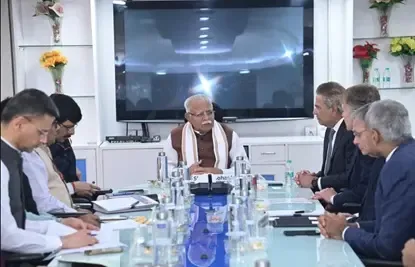Transitioning to a Circular Economy Could Generate 100,000 Jobs in India, Report Reveals

Synopsis
Key Takeaways
- 100,000 jobs can be created in India’s textile industry through a circular economy.
- The opportunity to tackle textile waste is valued at $3.5 billion.
- Key barriers include financial constraints and skill gaps.
- The report suggests a 5F approach for sustainable practices.
- Establishing textile waste collection centers is recommended.
New Delhi, Feb 17 (NationPress) Embracing a circular economy—which encompasses sharing, leasing, reusing, repairing, refurbishing, and recycling current materials—can facilitate zero waste in the fashion industry and potentially create 100,000 jobs in India, as stated in a report released on Monday.
The study conducted by Primus Partners, in collaboration with the Government of Maharashtra, provides a strategic framework aimed at transitioning India’s textile sector into a sustainable and circular economy by the year 2047. This report was unveiled at Bharat Tex 2025, which took place from February 14-17 at Bharat Mandapam.
The potential to tackle textile waste is estimated at $3.5 billion over the next five years, which necessitates strong policy backing, industry partnerships, and active participation from consumers. The transition to circular fashion could generate around 100,000 jobs in areas such as recycling, sustainable manufacturing, and innovation, according to the findings.
The report includes a thorough analysis that pinpoints critical obstacles hindering the adoption of sustainable practices, derived from a survey involving industries and citizens. Key challenges include financial limitations, inadequate adoption of green technologies, skill shortages, low awareness and demand for sustainable goods, and fragmented policies.
Moreover, the rapid rise of ultra-fast fashion, spurred by social media trends, has intensified the problem of textile waste.
The report employs a 5F approach—farm, fibre, factory, fashion, and foreign—to ensure that sustainable practices are integrated at every level of the textile value chain.
In addition, to bolster textile-waste management and market growth, it recommends establishing textile waste collection centers.
“In order to address the textile waste challenge in India, a comprehensive strategy is crucial, including a unified B2B digital marketplace for pre-consumer waste, enhanced consumer education, updated textile labeling, and skill enhancement,” stated Kanishk Maheshwari, Co-Founder and Managing Director of Primus Partners.
To fortify the policy and regulatory environment, the report advocates for a national policy dedicated to sustainable textiles and an Extended Producer Responsibility (EPR) scheme for the industry.
“The implementation of an Extended Producer Responsibility scheme will be revolutionary, making producers accountable for the lifecycle of their products and placing us at the forefront of a sustainable, circular economy,” Maheshwari added.









